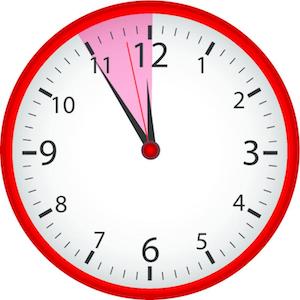20 Ideas to Overcome a Language Learning Block
 You're learning a new language. You've managed to get a good start, but now you notice that you're struggling to continue.
You're learning a new language. You've managed to get a good start, but now you notice that you're struggling to continue.
The learning is just not going smoothly. You start skipping a day here and there, then you miss a week or so. Sorting papers seems so much more important than learning and practicing 15 minutes or so in your new language.
Language Learner’s Block
Perhaps what you have is Language Learner’s Block. In many ways it resembles what we call Writer's Block.  Borrowing and adapting a definition: Language Learner’s Block “is the condition whereby a language learner cannot summon up the will and energy to continue learning a foreign language.” (From Fiction Writers’ Mentor)
Borrowing and adapting a definition: Language Learner’s Block “is the condition whereby a language learner cannot summon up the will and energy to continue learning a foreign language.” (From Fiction Writers’ Mentor)
There are all kinds of reasons for feeling blocked. A major reason is lack of confidence in yourself as a language learner. Constant self criticism may be sapping your motivation.
Maybe it's also frustration with your slow learning progress. You wanted to become fluent - in how many days, weeks, or months?
Or you feel stressed because of too may other commitments. But even people with a busy schedule manage to add a daily item they really want to do. I'm sure you've heard people say: “If you want to get a job done, find a busy person to do it”. So, being busy is not a good reason to stop learning a language you really want to learn.
A language learner's block is not foreign to me. I've been there a few times. But I've also found ways to keep going nevertheless. Here are a few practical ideas to help you too overcome your Language Learner’s Block.
Pick the one(s) that could work for you NOW. Once you're back in your routine, your confidence and motivation will pick up again, and you can try out some others later. Except for #1 - which is worth looking at anyhow from time to time - the other 19 are in no particular order.
20 Practical Tips
1. Reassess. Before you tackle the obstacles that keep you from continuing with your language, as yourself a few questions. Why are you learning your new language? Are you planning a trip? Do you need it for your career or move to a new country? Are you learning your language as a longer-term hobby? Which of the four skills - reading, listening/comprehension, speaking, writing - will be most useful to you? Which one to practice more?
 2. Limit your practice time. When Promise yourself that you'll do 5 minutes a day as a starter. When you've done your 5 minutes, stop. If you keep up this mini-routine even for a couple of weeks, you'll be on your way to creating a language learning habit. It's not how long you practice, it's doing it on a regular basis.
2. Limit your practice time. When Promise yourself that you'll do 5 minutes a day as a starter. When you've done your 5 minutes, stop. If you keep up this mini-routine even for a couple of weeks, you'll be on your way to creating a language learning habit. It's not how long you practice, it's doing it on a regular basis.
3. Set a daily reminder. Do this for whatever language task you've chosen. Most online programs have that option. Or, if you're like me, put the reminder on your short daily "to do" list and check it off when you're done. Doing something every day creates momentum.
4. Do small tasks. If you're using a program, do short lessons. If you're learning vocabulary, limit the number of words you memorize. If you're listening to a podcast, do the same one several times. Doing small tasks, but doing them every day really adds up to big results.
5. Set up your next task. When you're done for the day, write down a small task for the new material you'll want to tackle next. That'll make it easier for you to get right into it the next day.
6. Reward yourself. When you reach a small milestone - let's say 10 days in a row - treat yourself to something you enjoy. People have different ideas of a "reward", but for me a new ebook, listening to a song, a piece of chocolate, watching a TV show, all work well.
7. Write a journal. A sentence a day in your target language is great way to start a journal. Just write the way you would talk, and don't worry about making mistakes. No one's going to see it. With time, you'll become familiar with certain phrases and grammar patterns.
8. Try things out. Don't worry about making mistakes. Remember that your native language will interfere powerfully when you speak a foreign language. It takes time to become familiar with a new language. Focus on communicating rather than perfection.
 9. Listen to songs. Add some fun to your language learning and treat it as a hobby. Songs are a great way to internalize sounds and vocabulary. First listen to a song by following the text, then listen again and again. Try not to translate as you listen. Just focus on the meaning. (Language Zen is a great option if you'd like to learn with Spanish songs!)
9. Listen to songs. Add some fun to your language learning and treat it as a hobby. Songs are a great way to internalize sounds and vocabulary. First listen to a song by following the text, then listen again and again. Try not to translate as you listen. Just focus on the meaning. (Language Zen is a great option if you'd like to learn with Spanish songs!)
10. Watch movies. For your first movies, you'll probably want to see English subtitles. Then, when you're ready, start watching with subtitles in your target language. Again, try not to translate. You'll get many clues to the meaning just from the images themselves.
11. Read easy stories. A good start may be the "easy readers" which include vocabulary and translations of the language you want to learn. (We like Olly Richard's Short Stories, which you can also get with audios.)
12. Find new resources. Adding or switching resources can give you fresh ideas and new energy. Search the internet for materials available in the language you're learning. Join a language forum such as Polyglots, or My Polyglot, etc. to get recommendations from other members. Check out your library, listen to foreign books on Audible, try out a new language app, etc.
13. Add recall. It's better to spend a little time recalling what you've just learned than to cram in more new information. Also, keep in mind, recalling new information from time to time (spaced repetition) will put it into your long-term memory.
14. Memorize a short dialogue. Then, record yourself and play back the dialogue. This also works for practicing a telephone conversation in your target language. Tell yourself you'll just have to get used to hearing yourself speak in the language you're learning.
15. Practice pronunciation. Get a list and the audio of basic expressions and "listen and repeat" them many times. Record yourself and compare your pronunciation to that of the native speaker. Next time you converse in your target language, you'll be happy you did.
16. Work on Fluency. One way to improve your fluency is to listen regularly to podcasts in your target language. Or play streamed radio. Do this kind of listening practice whenever you're cooking, walking, exercising, etc. For real fluency, you need to internalize the intonation and rhythm of your new language, and this is a good way to do it.
17. Focus on practical phrases. Mastering greetings and basic conversational phrases is essential in any case. It's especially helpful for travels. If you're going to Paris for a week, it won't be that important to master the subjunctive.
 18. Socialize. Language is a fantastic tool for socializing. Find a meetup group, or join an online community to start using your new language to communicate. Rattling off phrases you memorized is very different from the dynamic back-and-forth of a conversation. Believe me, it's really exciting to be able to hold your own in another language.
18. Socialize. Language is a fantastic tool for socializing. Find a meetup group, or join an online community to start using your new language to communicate. Rattling off phrases you memorized is very different from the dynamic back-and-forth of a conversation. Believe me, it's really exciting to be able to hold your own in another language.
19. Tap into your inner actor. The well-known psycholinguist François Grosjean (author of the blog “Life as a Bilingual”) suggests that we don't really change personalities when we change languages. He states: "Different contexts and domains trigger different impressions, attitudes and behaviors. What is taken as a personality shift due to a change of language may have little, if anything, to do with language itself."
But, a different language will often put you into new and different situations, which in turn may change your attitudes and feelings. So, when speaking Italian, become Italian. Add Italian voice drama and characteristic gestures. Tap into your inner actor and explore new ways to express yourself.
20. Work on your attitude. It's easy to say: "Ah, I'll never get it. When I start talking with someone in my target language, my brain freezes up." Scratch those sentences from your inner vocabulary. Instead, tell yourself: "Every time I use my second language, I become more familiar with it, and my brain benefits."
Looking back at my own experience: I was born in Austria and my native language is German. But when I was nine, my family moved to the Netherlands. Since I attended a local school there, I had to learn Dutch pronto.
Two years later, we emigrated to Canada and this time I had to learn English fast. During high school and college, I added French. Much later, I started learning Italian and Spanish, and now I'm working on Danish, Swedish and Portuguese. Most recently, I've started dabbling in Finnish.
Each stage of my life and each language has confronted me with challenges that I've needed to deal with. I've used each of the above practical ideas at some point in my language learning life. I'd love to hear what works for you.
Bio: Ulrike Rettig is the co-founder of GamesforLanguage.com. She is a lifelong language learner, growing up in Austria, the Netherlands, and Canada. You can follow her on Facebook, Twitter and Instagram, and leave any comments with contact or below.
